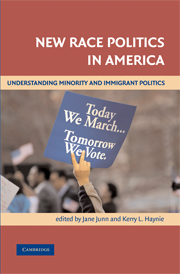Book contents
- Frontmatter
- Contents
- Contributors
- Acknowledgments
- 1 New Race Politics: The Changing Face of the American Electoral Landscape
- 2 In Whose Interest? Political Parties, Context, and the Incorporation of Immigrants
- 3 Beyond Black and White: The Experiences and Effects of Economic Status among Racial and Ethnic Minorities
- 4 Activity amid Diversity: Asian American Political Participation
- 5 Get Me to the Polls on Time: Coethnic Mobilization and Latino Turnout
- 6 Se Habla Espanol: Ethnic Campaign Strategies and Latino Voting Behavior
- 7 Structuring Group Activism: A Macro Model of Black Participation
- 8 Black Elites and Latino Immigrant Relations in a Southern City: Do Black Elites and the Black Masses Agree?
- 9 Understanding the New Race Politics: Conclusions and Challenges
- References
- Index
7 - Structuring Group Activism: A Macro Model of Black Participation
Published online by Cambridge University Press: 05 September 2012
- Frontmatter
- Contents
- Contributors
- Acknowledgments
- 1 New Race Politics: The Changing Face of the American Electoral Landscape
- 2 In Whose Interest? Political Parties, Context, and the Incorporation of Immigrants
- 3 Beyond Black and White: The Experiences and Effects of Economic Status among Racial and Ethnic Minorities
- 4 Activity amid Diversity: Asian American Political Participation
- 5 Get Me to the Polls on Time: Coethnic Mobilization and Latino Turnout
- 6 Se Habla Espanol: Ethnic Campaign Strategies and Latino Voting Behavior
- 7 Structuring Group Activism: A Macro Model of Black Participation
- 8 Black Elites and Latino Immigrant Relations in a Southern City: Do Black Elites and the Black Masses Agree?
- 9 Understanding the New Race Politics: Conclusions and Challenges
- References
- Index
Summary
Over forty years have passed since federal legislation began to dismantle the de facto racial discrimination prohibiting the participation of African Americans in the U.S. political system. The Civil Rights Act of 1964 and the Voting Rights Act of 1965 opened the door to a wealth of new opportunities for activity in mainstream forms of political participation that had long been denied to black Americans. For the first time since Reconstruction, African Americans across the nation could freely vote in elections, setting the stage for increases in black political participation. In the wake of this new political reality, blacks began to shift their energies away from protest strategies aimed at basic inclusion in the democratic process toward more conventional forms of political engagement. African Americans became active in voting in local and national elections, contacting public officials, attending political rallies and speeches, serving in local organizations and committees, and signing petitions in support or opposition to important issues that affect black communities, and a “new black politics” evolved from protest to electoral forms of political activism (Smith 1981; Rustin 1971; Preston 1987; Tate 1994).
These changes in the post–Civil Rights era raised new questions about African American political activity and generated a variety of explanations based on socioeconomic status, black political empowerment, racial group consciousness, and the importance of political context (Walton 1985; Bobo and Gilliam 1990; Tate 1991, 1994; Cohen and Dawson 1993; Dawson 1994a; Harris 1999; Shingles 1981).
- Type
- Chapter
- Information
- New Race Politics in AmericaUnderstanding Minority and Immigrant Politics, pp. 130 - 144Publisher: Cambridge University PressPrint publication year: 2008

